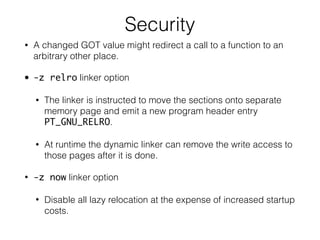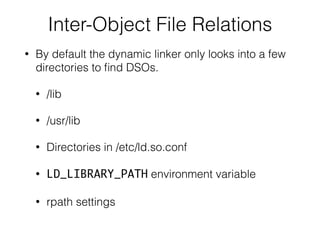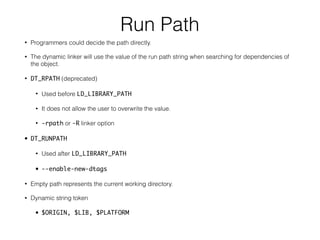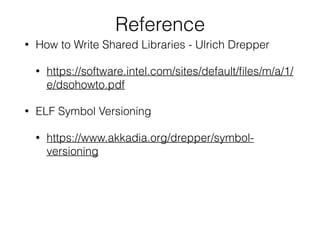The document discusses the ELF file format and dynamic linking process. It describes the ELF header, program header table, and segments that make up an ELF file. The dynamic linker loads segments into memory, resolves symbols using hash tables, and initializes shared libraries and the main executable in the correct order. Symbol resolution involves determining the symbol hash, searching hash buckets in each library, and comparing names.



![ELFmemory
ELF header
typedef struct
{
unsigned char e_ident[EI_NIDENT];
Elf32_Half e_type;
Elf32_Half e_machine;
Elf32_Word e_version;
Elf32_Addr e_entry;
Elf32_Off e_phoff; /* offset of Program Header table*/
Elf32_Off e_shoff;
Elf32_Word e_flags;
Elf32_Half e_ehsize;
Elf32_Half e_phentsize; /* the size of each entry */
Elf32_Half e_phnum; /* the number of entries */
Elf32_Half e_shentsize;
Elf32_Half e_shnum;
Elf32_Half e_shstrndx;
} Elf32_Ehdr;](https://image.slidesharecdn.com/howtowritesharedlibraries-161122145825/85/Something-About-Dynamic-Linking-4-320.jpg)
![ELFmemory
ELF header
typedef struct
{
unsigned char e_ident[EI_NIDENT];
Elf32_Half e_type;
Elf32_Half e_machine;
Elf32_Word e_version;
Elf32_Addr e_entry;
Elf32_Off e_phoff; /* offset of Program Header table*/
Elf32_Off e_shoff;
Elf32_Word e_flags;
Elf32_Half e_ehsize;
Elf32_Half e_phentsize; /* the size of each entry */
Elf32_Half e_phnum; /* the number of entries */
Elf32_Half e_shentsize;
Elf32_Half e_shnum;
Elf32_Half e_shstrndx;
} Elf32_Ehdr;
ELF Program
Header table](https://image.slidesharecdn.com/howtowritesharedlibraries-161122145825/85/Something-About-Dynamic-Linking-5-320.jpg)
![ELFmemory
ELF header
typedef struct
{
unsigned char e_ident[EI_NIDENT];
Elf32_Half e_type;
Elf32_Half e_machine;
Elf32_Word e_version;
Elf32_Addr e_entry;
Elf32_Off e_phoff; /* offset of Program Header table*/
Elf32_Off e_shoff;
Elf32_Word e_flags;
Elf32_Half e_ehsize;
Elf32_Half e_phentsize; /* the size of each entry */
Elf32_Half e_phnum; /* the number of entries */
Elf32_Half e_shentsize;
Elf32_Half e_shnum;
Elf32_Half e_shstrndx;
} Elf32_Ehdr;
ELF Program
Header table](https://image.slidesharecdn.com/howtowritesharedlibraries-161122145825/85/Something-About-Dynamic-Linking-6-320.jpg)
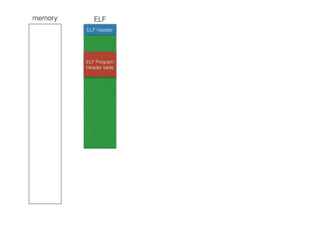
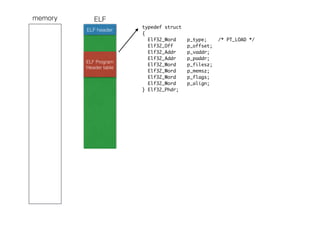
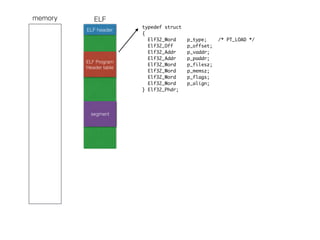
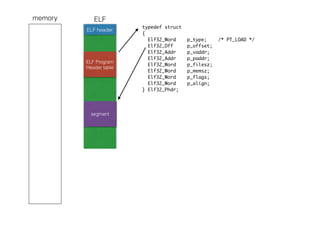
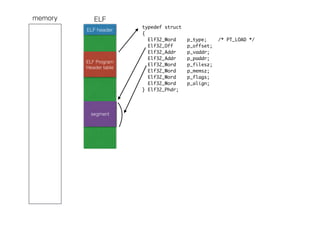
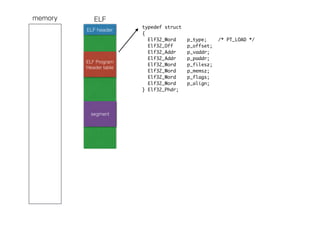
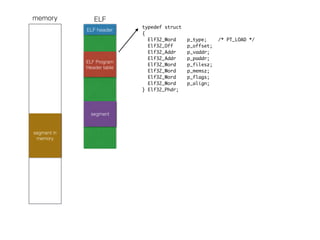
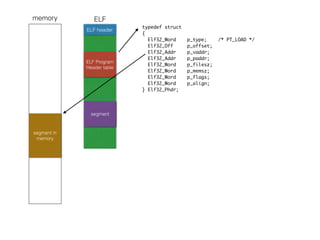
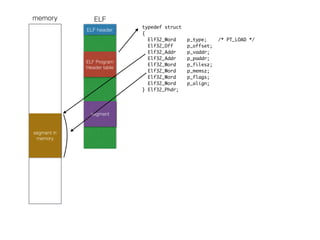
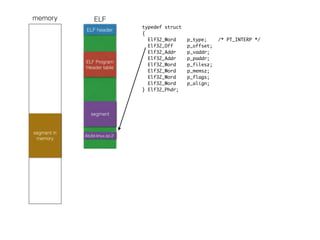
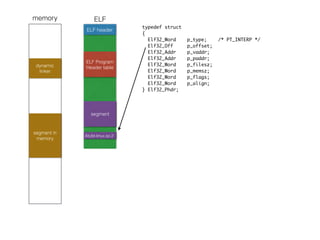
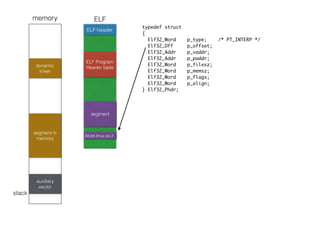
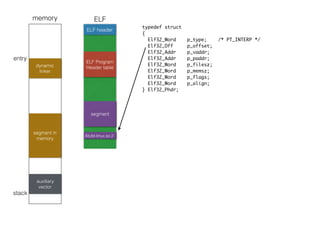
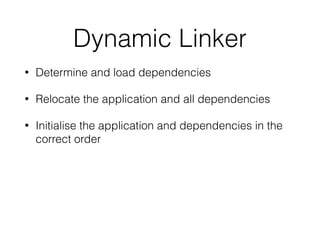
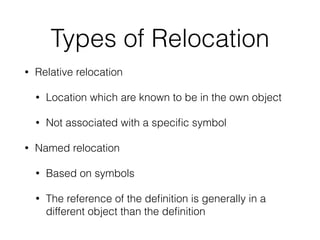
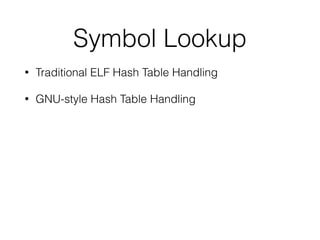
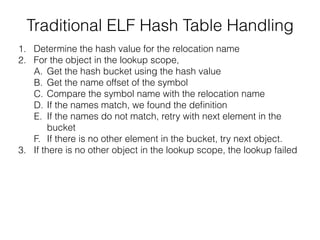
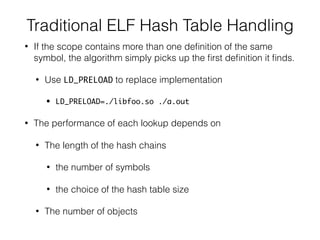
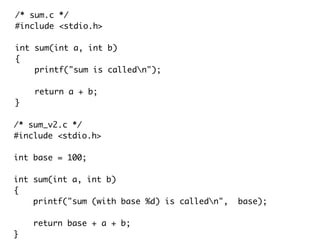
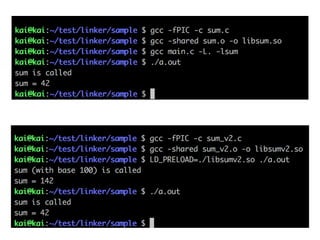
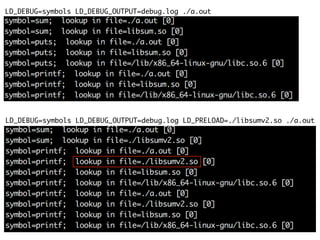
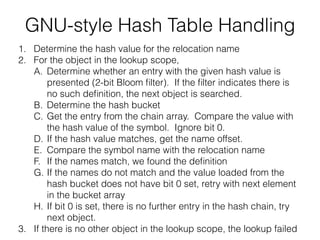
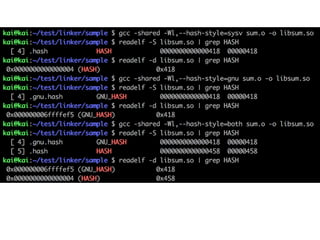
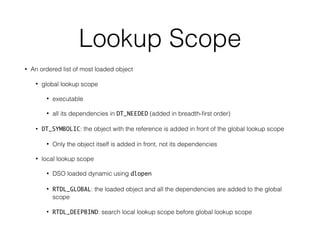
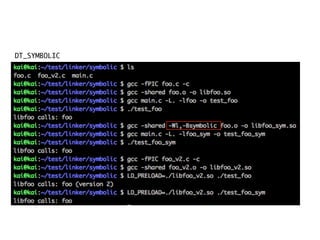
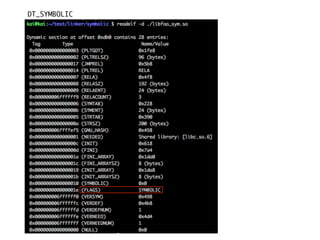
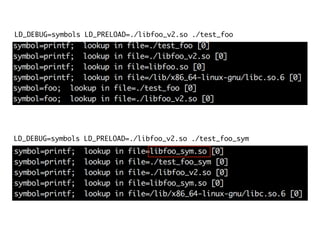
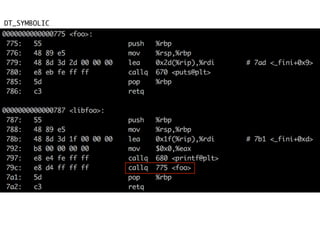
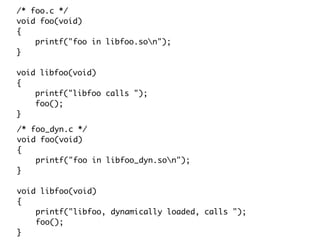
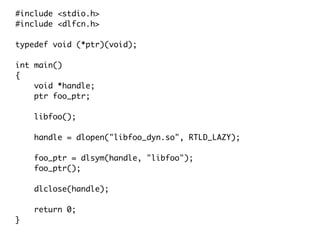
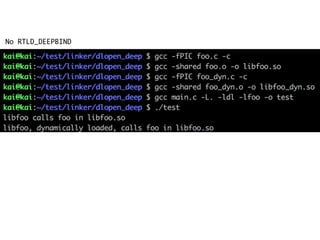
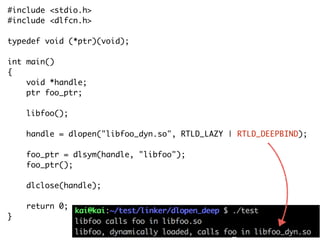
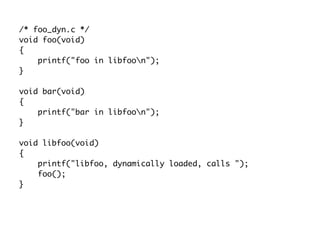
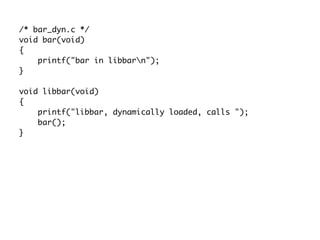
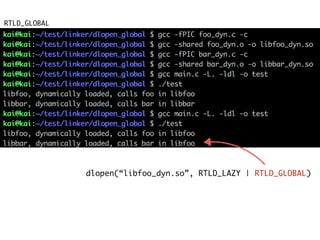
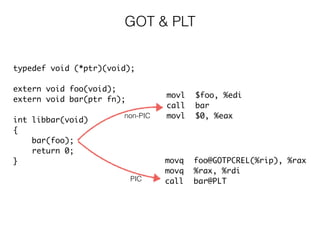
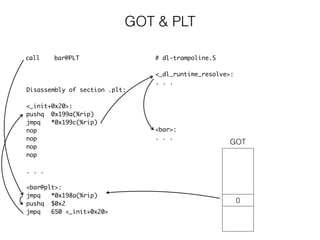
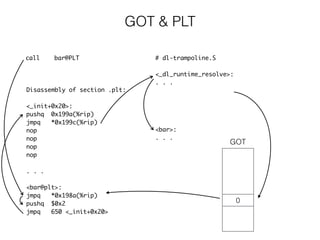
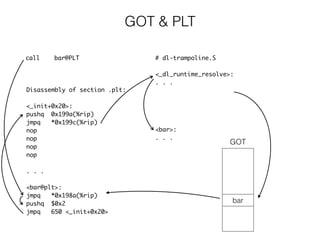
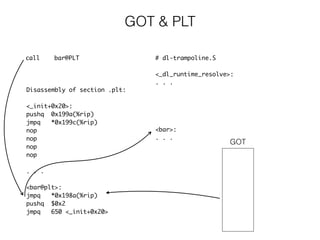
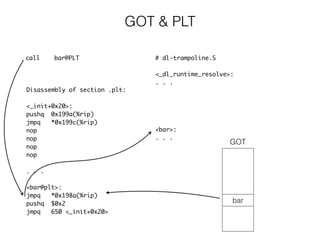
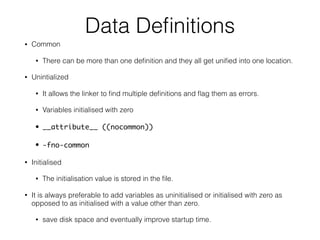
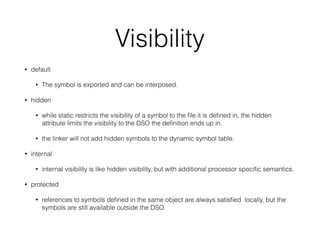
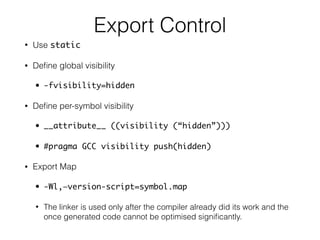
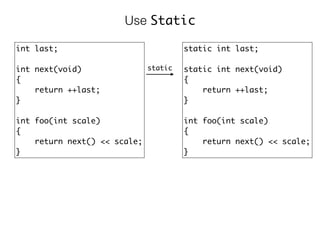
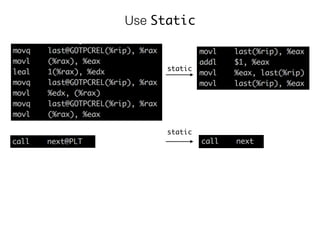
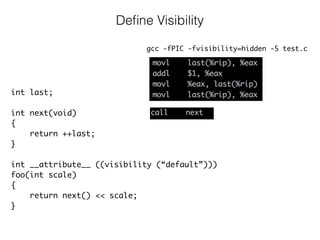
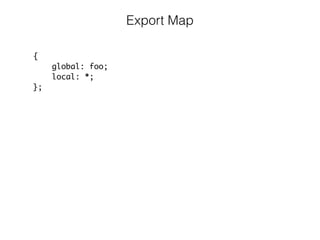
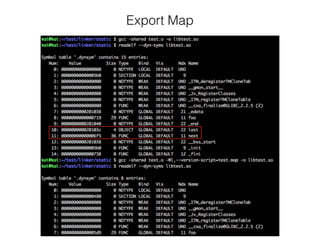
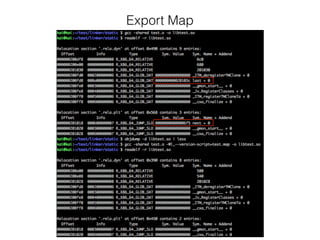
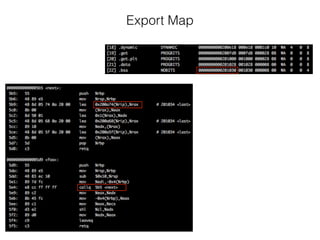
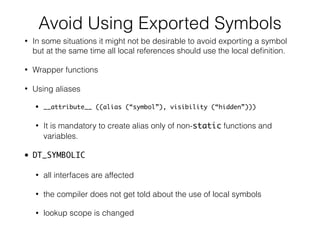
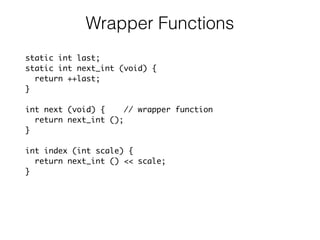
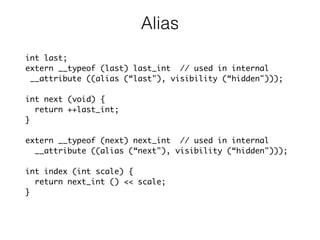
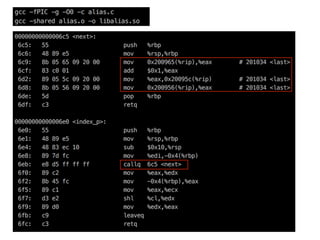
![Pointers v.s. Arrays
// the use of a variable is unnecessary.
char *str = “some string”;
// Here “str” is a name for a sequence of bytes.
// save one pointer variable in the non-sharable data segment
// save one relative relocation
char str[] = “some string”;
// compiler is able to move the string in read-only memory
const char str[] = “some string”;](https://image.slidesharecdn.com/howtowritesharedlibraries-161122145825/85/Something-About-Dynamic-Linking-62-320.jpg)
![Pointers v.s. Arrays
const char const *str = “some string”;
const char []str = “some string”;](https://image.slidesharecdn.com/howtowritesharedlibraries-161122145825/85/Something-About-Dynamic-Linking-63-320.jpg)
![Arrays of Data Pointers
// The total cost for this code is three words of data
// in writable memory and three relocations modifying
// this data in addition to the memory for the strings
// themselves.
static const char *msgs[] = {
[ERR1] = "message for err1",
[ERR2] = "message for err2",
[ERR3] = "message for err3"
};
const char *errstr (int nr) {
return msgs[nr];
}
// If the strings have different lengths it would mean
// wasting quite a bit of memory.
static const char msgs[][17] = {
[ERR1] = "message for err1",
[ERR2] = "message for err2",
[ERR3] = "message for err3"
};](https://image.slidesharecdn.com/howtowritesharedlibraries-161122145825/85/Something-About-Dynamic-Linking-64-320.jpg)
![Arrays of Data Pointers
// The cost of this code include three size_t words in
// read-only memory in addition to the memory for the strings.
static const char msgstr[] =
"message for err10"
"message for err20"
"message for err3”;
static const size_t msgidx[] = {
0,
sizeof ("message for err1"),
sizeof ("message for err1")
+ sizeof ("message for err2")
};
const char *errstr (int nr) {
return msgstr + msgidx[nr];
}](https://image.slidesharecdn.com/howtowritesharedlibraries-161122145825/85/Something-About-Dynamic-Linking-65-320.jpg)
